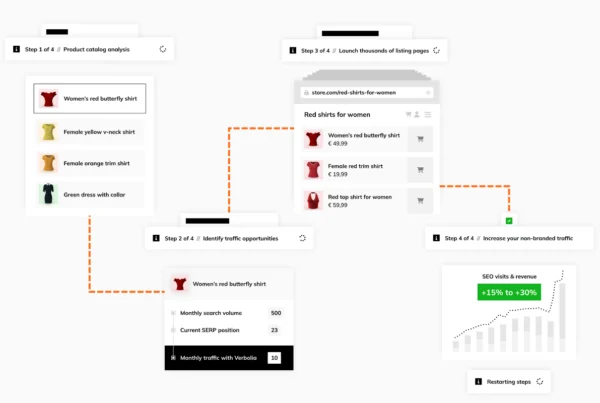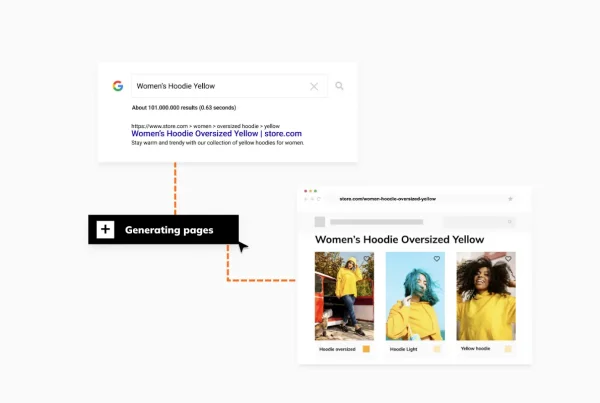Blog article
How important is content freshness?
Estimated reading time: 5 minutes

Picture this: in 2020 there will be 40 zettabytes of data on the internet. Now, you probably know about bytes, and, well, zettabytes are bytes * 1.000.000.000.000.000.000.000.000—a truly superhuman level of quantification.
Within those 40 zettabytes, only a fraction will be “crawlable” by Google, but the main takeaway is that a lot of content is being created every day. Given Google’s mission to serve the best answers to a user’s questions, it makes sense for Google to seek out the most up-to-date content about a specific subject.
Google freshness update
As such, in June 2010, Google pushed an update (caffeine) that would impact newly published and older content. The main category affected was news; events, politics, celebrities, trends and other time-sensitive information types.
This actually draws a line between two types of content; stale content (static) and fresh content (updated).
In actuality, not all content needs to be updated regularly. There is perfectly useful evergreen content that will remain true for years to come, such as “What is a king-size bed?”. There’s a fair chance that this information will still be true in 10 year’s time, and will not benefit much from an update.
For this type of content, you should focus more on: “is my article the best, most informative and clearest one on the internet?” rather than updating middling content with some more middling content.
So is content freshness even a thing then? Well, yes it is, and as with many things SEO, it’s all a matter of logic.
Does your content deserve freshness?
In 2007, Amit Singhal developed an algorithm that favored freshness, but only for some particular subjects and queries.
Those queries are called QDF (query that deserves freshness). Note how there’s a “deserve” in there. Basically, it means that not all queries need to have the latest creation dates.
The main question you have to ask yourself is, “what is the most useful content for my target audience?”
If you have a news site, and you only publish last month’s news, do you think you answer your users’ needs? If you have an e-commerce shop, and you change your product page content three times per week without adding any meaningful information, are you serving your customers right?
Well, the answer is mostly no. The question would be more, “is my product page complete with all the necessary information?” If the answer is yes, you can probably move on and work on another product page that might not be as good.
Freshness & Frequency
There is a misconception about content freshness and update frequency; that both are one and the same. Wrong. They often intersect; but in essence, they are two different things.
Frequency is about the rate at which you publish on your website.
Content freshness is about the information you publish; is it up to date information?
So, you could very well—as some less informed SEO’s suggest—publish the same article, only changing the publication date, and consider it a fresh update. Well, that would count for your update frequency, but would not count as fresh content. Google even considers this as a hack, and has, on numerous occasions, said that this does not help at all.
Here is how you should see these two concepts coming together: the frequency of fresh updates will send a signal to Google that it needs to visit your site a certain number of times per month in order to catch all of your new content.
So, the more you publish fresh content, the more Google will crawl your page.
Will you benefit from more fresh content?
Remember the QDF concept? Those are the queries that are time sensitive which are mostly news related, whatever the type; politics, technology, celebrities, sports… History articles are not news. This means that, if I write a great article about the history of the Silk Road, updating it with meaningless changes every week will be useless.
This brings us to the question of, “is it even useful to update my webpages?” You probably know where this one is going; it depends. One factor that determines content freshness is the first crawl date, and that is something you cannot change. If you don’t have meaningful updates to offer, you will probably gain very little by updating your pages. On the other hand, real meaningful updates can have an impact.
Conclusion
What content freshness really does is direct our attention to the importance of serving the best information available. Of course, it’s just one of the numerous aspects of Google’s algorithm. It should motivate you to serve up-to-date information on your website, and to keep content usefulness in mind. And if you do it correctly, it could well positively impact on your rankings!
Unlocking the power of search engine optimization (SEO) is a game-changer for any ecommerce business. Among the myriad of SEO strategies, one stands out as essential: keyword research. But how do you navigate this seemingly complex process? Buckle up, because we’re about to embark on a journey into the world of ecommerce keyword research.
About The Author
How can Verbolia help your e-commerce platform.


